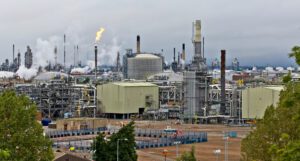Scotland’s last remaining oil refinery at Grangemouth will close between April and June next year, resulting in the loss of 400 jobs and leaving the UK with only a handful of refineries.
The closure, announced by Petroineos—a joint venture between Sir Jim Ratcliffe’s Ineos and PetroChina—comes as domestic demand for motor fuels declines, exacerbated by the forthcoming ban on new petrol and diesel cars.
Frank Demay, Chief Executive at Petroineos Refining, stated that the demand for key fuels produced at Grangemouth has already started to decline. “With a ban on new petrol and diesel cars due to come into force within the next decade, we foresee that the market for those fuels will shrink,” Demay said. The company cited the costs of maintaining a refinery built nearly a century ago as a significant factor in the decision.
The announcement has sparked criticism from political leaders and unions. UK Energy Secretary Ed Miliband expressed deep disappointment, while his Scottish counterpart, Gillian Martin, and union leaders condemned the decision as “industrial vandalism.” Grangemouth currently accounts for about 14% of the UK’s overall refining capacity, supplying motor fuels and other products across Scotland and northern England. Although the UK remains a net exporter of petrol, it relies on imports for diesel and jet fuel.
To mitigate the impact of the closure, Petroineos plans to establish an import and export fuel terminal at the site, ensuring continued supply to forecourts and other customers. The refinery has faced ongoing financial challenges, with accumulated losses of $775 million since 2011 despite a $1.2 billion investment. Its ageing infrastructure, originally opened in 1924, is less efficient than that of overseas competitors and requires an additional £40 million to remain operational beyond next spring.
Approximately 75 workers will stay on to operate the new terminal, while up to 280 jobs will be lost in the three months following the closure. Another 100 employees will remain for up to a year to begin decommissioning, with a small number staying on for longer to oversee further decommissioning and demolition efforts.
The UK and Scottish governments have commissioned studies to explore potential future uses for the refinery, with options including hydrogen, biofuels, and sustainable aviation fuel. However, these alternatives are unlikely to be implemented before the refinery shuts down. In response, the governments have announced a joint investment plan, adding £20 million to the previously announced £80 million Falkirk and Grangemouth Growth Deal, aimed at funding new growth projects in the area. The UK government also plans to explore using its National Wealth Fund to support alternative uses for the refinery site.
The closure is expected to have significant ripple effects on the wider economy, impacting numerous small businesses reliant on the refinery. Hisashi Kuboyama from the Federation of Small Businesses in Scotland highlighted the broader consequences, warning that “the knock-on effect on the supply chain will have an impact on numerous small businesses across the length and breadth of the country, putting many more jobs than the 400 on site at risk.”
Sharon Graham, General Secretary of the Unite union, criticised both Petroineos and politicians for failing to safeguard the workforce until alternative employment opportunities are secured. “This dedicated workforce has been let down by Petroineos and by the politicians in Westminster and Holyrood who have failed to guarantee production until alternative jobs are in place,” Graham said. She called on the Labour government to demonstrate its commitment to workers and communities, adding, “The road to net zero cannot be paid for with workers’ jobs.”
The decision to close the refinery does not directly impact other petrochemical operations at the Grangemouth complex, which will continue to operate. However, the closure represents a significant shift in the UK’s energy landscape, further increasing the nation’s reliance on imported fuels and raising questions about the future of the site and the community that depends on it.
Read more:
Grangemouth oil refinery to close in 2024, risking 400 jobs and increasing UK fuel imports


























